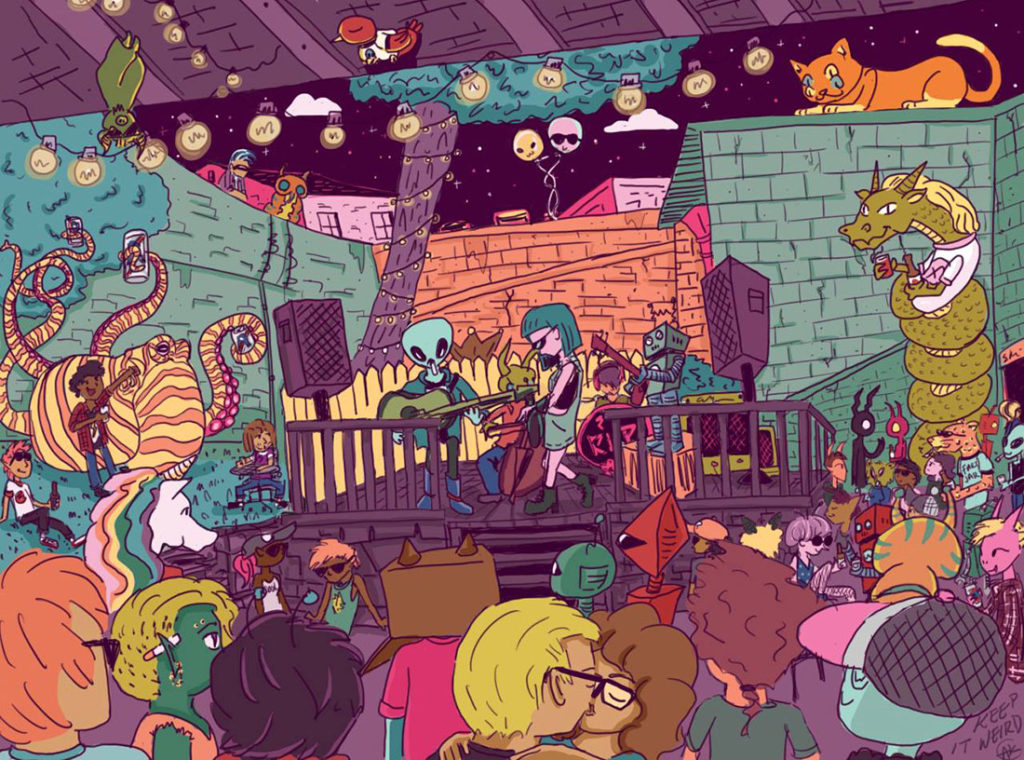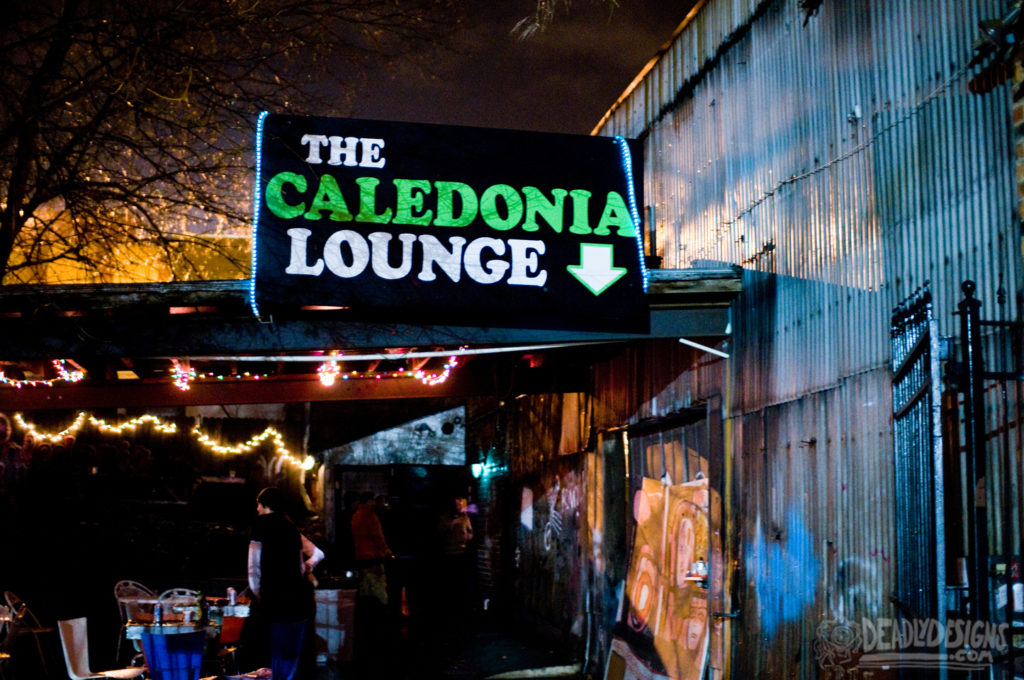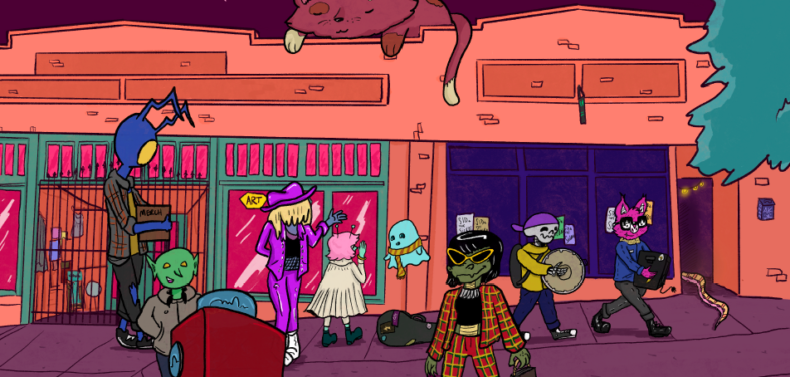Pause to take a headcount, and you’ll find that the 40 Watt Club, Georgia Theatre, Foundry, Morton Theatre and countless other performance spaces in town have yet to reopen after eight long months of the pandemic. Music venues depend on large gatherings. They were the first businesses to shut their doors, and as far as anyone can tell, they will be the last to re-open them—if they can hold on for that long.
According to a survey released in June by the National Independent Venue Association, 90% of 2,000 music-venue owners, promoters and professionals from across all 50 states indicated that they would have to close permanently if they did not receive federal funding within six months from the start of the pandemic. Currently, NIVA is running an emergency relief fund for vulnerable venues and promoting a #SaveOurStages campaign as the Heroes Act and RESTART Act await their fate in the hands of Congress. Billboard, meanwhile, is keeping a running list of venues closing across America, with over 80 so far and rising. We were warned, and now we see the fallout within our own town as the beloved Caledonia Lounge—along with neighboring vintage emporium Atomic—closes on West Clayton Street downtown.
Caledonia and Atomic—owned by husband-and-wife Bryant and Stephanie Williamson, respectively—have always resembled entire ecosystems that buzz with creative energy. Caledonia, the ultimate Goldilocks of venues, is large enough to feel legitimate, yet intimate enough to provide a deeper sense of community, as those on stage and those on the floor swap places regularly. With its treasure trove of vintage clothing, knick-knacks, records, local artwork and one-of-a-kind finds, Atomic has always been a reflection of the 40 or so artists and collectors who share their side hustles under one umbrella.

Retro Fashion of the Future
Like other businesses deemed non-essential, the fashion industry’s retail giants, independent brands and brick-and-mortar shops were severely affected by the pandemic’s lockdown. The resale industry, meanwhile, has experienced positive economic growth as sheltering-in-place shoppers have migrated to online consignment and secondhand platforms like Depop, Mercari, thredUP and Thrilling. If anything, the pandemic accelerated a trend toward vintage that was already underway, as an interest in sustainability has increasingly guided consumer behaviors in recent years.
Pivoting to online storefronts comes with setbacks—the tedium of describing articles of clothing in hyper-specific detail for listings, the general over-saturation and competitiveness of the online marketplace, the basic inability to try on different clothing—but it’s also been essential to the operations of many brick-and-mortar businesses struggling to survive. Still, these are two very different business models that require different spaces in the long run. Faced with the many logistical obstacles of safely reopening a business that depends on high foot traffic—in combination with the likelihood that the building could soon be sold to a new owner—Stephanie Williamson began moving out of the Clayton Street storefront in early September.
“When I opened, I wasn’t sure how to step out of the successful shadow cast by Agora and Airee,” says Williamson, who launched Atomic five years ago after the former tenant, Agora—Airee Edwards’ vintage shop, where Williamson learned the ropes as a seven-year employee—relocated to Broad Street.
“Atomic became what it is today thanks to the talented vendors and artists we were fortunate to host, and because of the people who gave us so much love and support through the years,” Williamson says. “We’ll miss seeing everyone in person. Our address may have changed, but our love and support remain the same.”
There may not be a silver lining to any of this, but there is a silver bullet. Specifically, the iconic Airstream trailer that was previously used as a greenroom on Caledonia’s patio will be renovated into a mobile storefront for Atomic. The vintage Airstream perfectly embodies the retro aesthetic of Atomic and, more importantly, will offer a flexible solution for navigating through an unpredictable time. Face-to-face connections have always been the charm and reward of Atomic’s storefront, and a smaller space will provide a safer experience for those chasing the thrill of the treasure hunt for vintage gems.

Grist for the Mill
March’s lockdown on non-essential businesses and subsequent loss of income left commercial tenants across the state scrambling to renegotiate rent payments and seek legal protection from eviction. In terms of finding any compassion from a landlord, the initial arrangement with property owner Joey Tatum started off as a best-case scenario for the Williamsons. Tatum, who also owns the Manhattan Café business as well as the Little Kings Shuffle Club and Hi-Lo Lounge buildings, has a long history of playing a role in helping to jumpstart small, distinctive businesses.
Tatum offered to waive rent while the businesses were closed, and this mutual agreement afforded time for the Williamsons to run crowdsourcing campaigns to offset Atomic’s lost vendor-booth fees, which had previously covered rent, and to provide immediate relief to Caledonia’s employees, who had an unclear path ahead of them seeking unemployment benefits. An Economic Injury Disaster Loan grant from the U.S. Small Business Administration went toward Caledonia’s rent.
The months anxiously and slowly stretched along, as they now seem to do in the new pandemic flow, and in July Tatum announced that he planned to show the building to potential buyers. One of those potential buyers was Jon McRae, who owns the bar Sister Louisa’s Church next door and had expressed interest in the building multiple times to Tatum over the past several years.
“After our successful GoFundMe campaign, I 100 percent wanted to keep Caledonia alive but felt that a fair chance was not on the table,” says Bryant Williamson, who says he attempted to discuss formulating a long-term, sustainable fundraising plan for Caledonia’s survival and requested—but could not get—a lease, for a sense of some security moving forward. “I did not want Caledonia to close,” he says.
In September, Tatum offered to rent the venue’s outdoor patio to McRae as a short-term, symbiotic setup to help keep things afloat. Aware of the looming reality that the building could soon be sold—and with no new renegotiations, no straightforward path toward recovery or even a predictable timeline—Williamson closed Caledonia shortly thereafter. He hopes to be able to continue Caledonia’s legacy in some capacity in the future.
From here, the drama further splinters into fragments difficult to reconcile. Though whispers had been circulating underground for a few weeks, news finally broke through social media that Atomic and Caledonia had both closed, with McRae in line to acquire the property. Church’s expansion was immediately met with pushback. Longtime Church employees Megan Sparks and Thomas Fletcher quit their positions and co-wrote a public statement raising concerns about McRae’s patterns of profiteering off queer and marginalized people and using his position of power to manipulate young women. These sentiments were echoed in a statement, released in solidarity with victims, through which the Kourtesans drag troupe announced a decision to end a relationship with Church.
Though McRae has declined to comment to Flagpole, he is on record with the Athens Banner-Herald confirming Church’s expansion into the spaces formerly occupied by Atomic and Caledonia. In the Oct. 28 Banner-Herald article, he says that renovations are underway, and that he intends to continue operating Caledonia’s space as a performance venue.
During a phone call on Nov. 5, however, Tatum told Flagpole the former Caledonia building has not been sold or leased to McRae. According to Tatum, McRae has only a “handshake” agreement to rent the outdoor patio and was given a key to Caledonia’s space in order to access the circuit breaker for the patio lights. Tatum plans to continue weighing all possible short-term and long-term options for how the space can be effectively occupied.
In short, the story encompases a series of confusing communication breakdowns, ill-fated survival strategies, grist for the Athens townie rumor mill and alternate realities where everyone seems to lose.

Small but Mighty
Every musician must start somewhere. With the exception of a few outliers who achieve a strange, overnight stardom via viral streaming, most musicians simply begin honing their craft at the small spaces available in their hometowns. From there, their audience grows as they move up the ladder of venue sizes, and this traditional framework includes touring to establish stronger fanbases in other cities over time. Without small venues for up-and-coming acts to cut their teeth, the bottom simply falls out.
“For the local music scene, we have lost a vital part of the path for bands in Athens, both local and touring,” says David Barbe, the director of UGA’s Music Business Program and the owner of Chase Park Transduction recording studio.
“If you can do well at the Caledonia, you can get a shot at the 40 Watt,” Barbe says. “If you can sell 450 tickets at the 40 Watt, that puts you on the path to sell 1,000 tickets at the Georgia Theatre. In the last year, we have lost both Caledonia and Go Bar, two prime system-feeders. This will only make it more difficult for the college-aged bands, on which our town’s famous music scene was built, to break in. At one time, every major musical act to come out of Athens started out playing to a handful of friends in one of our small clubs.”
Of course, not everyone is concerned with attendance numbers or national tours. For many musicians in Athens, performing is a more primal, normalized activity within their routines: They walk their dogs, they ride their bikes, they play their instruments. Small venues serve a crucial role in nurturing this lifestyle by providing low-stakes opportunities for public experimentation, playfulness and the pursuit of niche interests. Without access to space, there is less motivation to materialize new ideas, and the momentum of a music scene plateaus.
Small venues like Caledonia can also afford to take programming risks that larger venues with higher production costs often cannot, and this flexibility contributes to the success of numerous festivals, showcases and special events in return. More importantly, this enables direct leadership and active participation to come from independent organizers, instead of being controlled by industry gatekeepers. Local initiative reflects the wider community with greater authenticity. Intentional, mindful community-building is the crux of what distinguishes places like Atomic and Caledonia from bottom-line-focused businesses.

Finding Community
Following in the footsteps of the 40 Watt Club, which had also occupied the space at 256 West Clayton St. once upon a time, Caledonia originally opened in 1999 under the ownership of Kaya Yamashita and Karen Sweeney Gerow. Bryant Williamson bought the club in 2010. Since its early beginnings, Caledonia has always held the longstanding reputation of being the prime destination for grittier, higher-decibel nights of punk and metal music. This remained true right up until the lockdown, with many of its recent shows orchestrated by local heavy-metal record shop and event promoter Shadebeast. Both Atomic and Caledonia have always been magnets for the artists, creative entrepreneurs, indie-rock enthusiasts and outright oddballs who populate any alternative scene. Over time, though, the Williamsons became increasingly dedicated to creating refuge for members of the community who have experienced marginalization.
Intrusive Thots, the Kourtesans, Queer Heaven! and other frequent drag shows served as spectacular celebrations of gender-bending, boundary-breaking performance art, with several even raising funds for Live Forward, Youth Pride and Stacey Abrams’ 2018 campaign for governor. Quaint, a reoccurring art-making event organized by Abe Bocinec in partnership with The Cottage, provided a sober, safe space for queer individuals to find community and healing.
Even while their own doors were closed, the Williamsons offered space to the Athens Community Fridge, a 24-hour mutual-aid program that addresses food insecurity by providing free, fresh produce and staple items to anyone who needs them.
“We have lost a place that completely encapsulated the vibe of the local scene,” says Barbe. “You can’t just open a small room and call it good. You need the creative, can-do collective spirit that fuels a DIY indie music scene. Without it, you might have a PA, a bar and some colored light bulbs, but none of that is what makes a club special. It’s the people. This cannot be overstated.”

Following the 2010 closure of Tasty World, a downtown venue widely considered the most hospitable spot for local hip hop at the time, Caledonia stepped up as a welcoming stage for hip hop artists to be unapologetically loud and proud. Within a national music industry fraught with systemic racism, discrimination and exploitation faced by Black artists—only compounded by a small Southern town’s own history and legacy of social inequity—the importance of finding fair access to resources and simple space for fellowship cannot be overemphasized.
The disappearance of small, independently owned businesses from the downtown landscape is not a new trend. It is a steady downward spiral that began by displacing the majority of the Black entrepreneurs several decades ago. Centered at the intersection of Washington and Hull streets, the Hot Corner served as a business district and cultural hub for the Black community for decades. What was once the territory of over 60 Black-owned businesses has been whittled away to all but a few.
“When I hear people say downtown is changing, it will never be the same, I want them to remember it has been that way for many generations of Black people,” says Montu Miller, who has promoted countless shows at Caledonia through ATHfactor-Liberty Entertainment. “The Black community, the hip-hop community, has had to fight an uphill battle to maintain just a small space where we are welcomed to be ourselves.”
“Downtown Athens is changing, and it probably will never be the same, but what are you going to do about it? Will you sit back and nostalgically complain, or will you demand that downtown reflect the people of Athens—because it has not been a reflection in a very long time. Caledonia, The Hot Corner, Tasty World and the other countless special places will only be missed if we let them be forgotten by allowing the essence of what they stood for die.”
Currently, the Athens-Clarke County Commission is considering a proposal to establish a historic district on the west end of downtown in an effort to preserve Black history landmarks and protect the current small businesses in the area from the encroachment by upscale developments. The proposed district includes the buildings on West Clayton Street that formerly housed Atomic and Caledonia and, if passed, will set design guidelines and require property owners to gain approval before renovation or demolition. After several delays and revisions, the vote is now scheduled for Nov. 17.
No matter when and no matter to whom, the Clayton Street building will inevitably be sold at some point—that is inarguably the basic right of any property owner. According to Tatum, the building was last valued at $1.4 million by the tax assessor, though the market value likely would be much higher. That’s a pretty penny for just about anyone in the business of slinging tallboys.
The downtown visual and economic landscape has shifted drastically as monolithic apartment buildings, chains and franchises have choked out smaller independent businesses, making the barriers to entry nearly impossible to hurdle for members of the creative community. Recovery will require critical and creative thinking among entrepreneurs, organizers and all the artists, musicians and industry workers within their orbits.
In a town potentially left cratered by closures, where will the next generation play?
Visit here to read favorite memories and reflections on Atomic and Caledonia from local musicians, artists and other community members.
Like what you just read? Support Flagpole by making a donation today. Every dollar you give helps fund our ongoing mission to provide Athens with quality, independent journalism.










